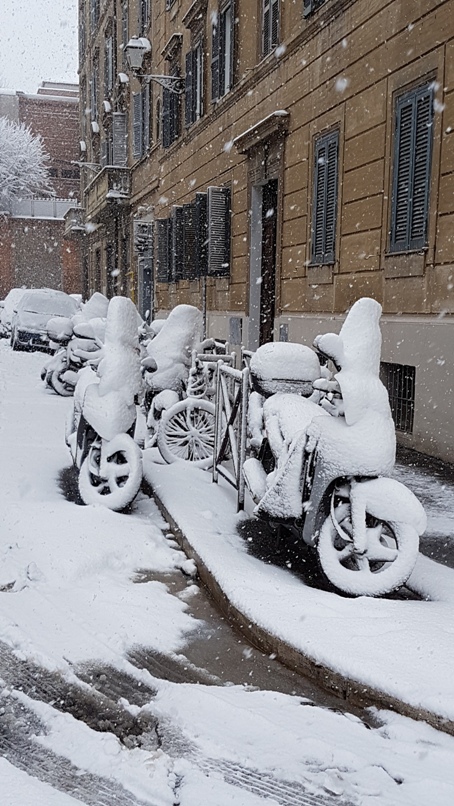Reflections on a Term at the Gregorian University
 One of the biggest surprises that I faced was how bad the weather was. For the first 35 days or so, it rained heavily for 85 to 90% of the time! I was beginning to feel a bit like Noah. They tell me that this much rain is unusual. I live in southern California, so with temperatures hovering at 50 degrees, I was forever freezing! Rain was not enough, however. We had 6 inches of snow on Sunday night, February 25! On Monday morning, I slogged my way the two miles up and down hills on cobblestone streets in borrowed shoes. When I arrived at the university, the guard informed me that it was a “snow day” and the university was closed. Why, I wondered, didn’t anyone call to let me know? I turned around and slogged back to the Lay Centre and climbed back into bed to thaw out. As I walked past the Coliseum, there were hundreds of people, children to adults and from many countries, having a massive snowball fight. People on surrounding roofs were tossing them down on those of us walking below. A little bit of snow had turned everyone into children once again. The next day, the snow had turned to ice, and I slipped and slid to the university. Fortunately, I had a good class that Wednesday. The temperature had risen to 65 degrees – almost beach weather!
One of the biggest surprises that I faced was how bad the weather was. For the first 35 days or so, it rained heavily for 85 to 90% of the time! I was beginning to feel a bit like Noah. They tell me that this much rain is unusual. I live in southern California, so with temperatures hovering at 50 degrees, I was forever freezing! Rain was not enough, however. We had 6 inches of snow on Sunday night, February 25! On Monday morning, I slogged my way the two miles up and down hills on cobblestone streets in borrowed shoes. When I arrived at the university, the guard informed me that it was a “snow day” and the university was closed. Why, I wondered, didn’t anyone call to let me know? I turned around and slogged back to the Lay Centre and climbed back into bed to thaw out. As I walked past the Coliseum, there were hundreds of people, children to adults and from many countries, having a massive snowball fight. People on surrounding roofs were tossing them down on those of us walking below. A little bit of snow had turned everyone into children once again. The next day, the snow had turned to ice, and I slipped and slid to the university. Fortunately, I had a good class that Wednesday. The temperature had risen to 65 degrees – almost beach weather!
As I noted earlier, a number of people in Rome know who I am. Many of them have followed my writings on issues of interest to Catholics. Patsy and I visited the Pontifical Council for Promoting Christian Unity, which oversees the Catholic – Pentecostal Dialogue, where we spent a morning with Monsignor Juan Usma Gomez, a Colombian priest who oversees all dialogues with Pentecostals, Charismatics, and Evangelicals for the Vatican. Bishop Brian Farrell, a longtime friend and Secretary of that office met with us for two hours, and Cardinal Koch, the President of the office took time out to have coffee with us.
Professor Teresa Francesca Rossi, Assistant Director of the Centro Pro Unione, an ecumenical think tank in Rome, also teaches theology at the Dominican run Pontifical University of St. Thomas, otherwise known as the Angelicum. She invited me to give a 75-minute lecture on “Pentecostal Preaching” followed by a 45-minute time for questions and answers with about 20 students on March 13.
For Pentecostals, preaching is a complex activity that seeks to carry the message that God wants the world to hear.
Pentecostals anticipate that from the invocation through the benediction, the Holy Spirit is both present and waiting to speak. It may come through a charism of speech or more commonly in Pentecostal preaching. They believe that God will speak through the preacher by means of the Spirit. They not only listen to the words spoken by the preacher, but they listen for the voice of the Holy Spirit who leads the preacher. The sermon is a place of Divine – human encounter. They believe that they are in the presence of God as the Word of God is preached.
I went on to speak about various preaching forms and the styles of preaching found in Pentecostal churches. I told them that it ranged from a “jumble of Scripture and shouting” to well-planned expository sermons, to sermons based upon the preacher’s personal testimony, sermons that work on solutions to daily problems, as well as topical studies. I explained that Pentecostals do not usually follow a lectionary, so sometimes pastors preach on their hobbies, or from the Pentecostal “canon within the canon”, the Book of Acts, 1 Corinthians 12-14, Romans 12, Ephesians 4, and 1 Peter 4:10-11. As a result, many Pentecostal congregations are not well rounded. Many years ago, Dr. Russell Spittler noted that Pentecostals place a high value on spontaneity.[1] I noted that
Spontaneity is valued because Pentecostals believe that it signals the openness of the People of God, both preacher and congregation, to the interventions of the Holy Spirit. As a result, Pentecostals often protest against preaching based upon manuscripts. They prefer to hear a thoughtful sermon that has been prepared in a meeting between God, the biblical text, and the preacher, one that may follow a simple outline, but which allows space for the Holy Spirit to take the initiative and move among the people of God at any given moment during its delivery.
Category: Ministry, Spring 2018


